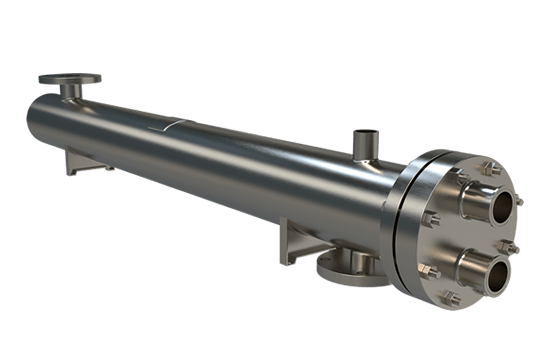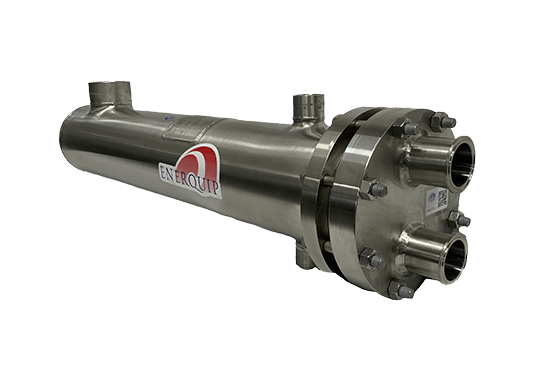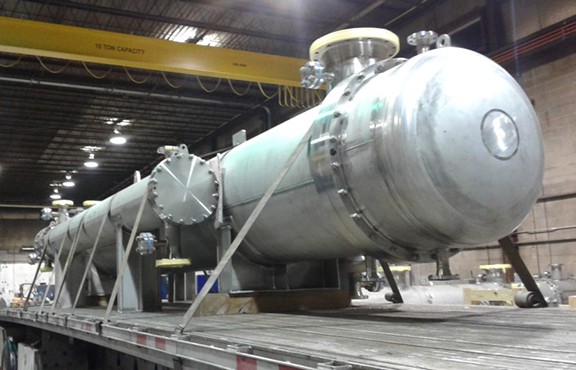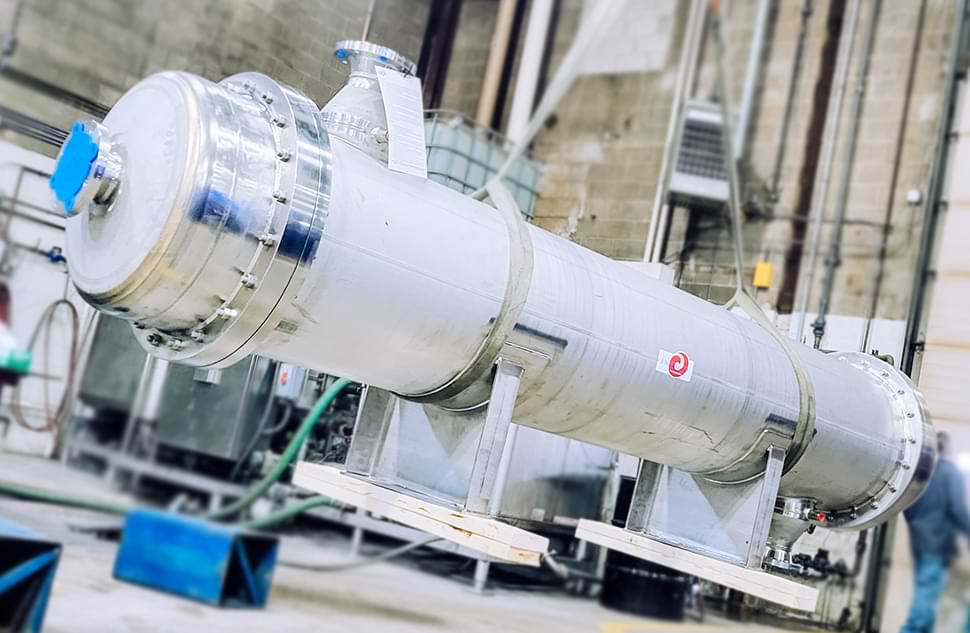Oil Refining Heat Exchangers
We recognize the unique challenges and priorities involved in designing heating and cooling solutions for the refining and gas processing industries. Adhering to stringent safety standards and operating requirements around the clock make it essential that pressure vessels are meticulously designed to meet ASME Code, TEMA-R guidelines, and API-660 compliance.
- Thermal Fluid Heaters: Designed for various process heating applications throughout the oil refinery process.
- Viscous Fluids: Specifically engineered to heat viscous fluids such as heavy crude oil, No. 6 oil, and asphalt.
- Bayonet Immersion Heaters: Crafted to efficiently heat entire tanks of fluid, effectively transferring heat to large volumes of liquid.
Stock Units
Sanitary Applications
- Evaporators & Condensors
- Clean-in-Place
- Bio-Tech

Custom Units
Sanitary Applications
- Brewery & Distillery
- Food & Beverage
- Dairy Pasteurization

Heat Exchangers for the Oil Refining Industry
Heating Equipment for Crude Oil Production
Process heating plays a vital role in crude oil production. From material processing to pumping and transporting oil, many refinery operations depend on thermal fluid heaters and heating systems. Consequently, there is a high demand for top-quality, durable industrial heating systems in refineries.
So, where do many crude oil industry facilities turn for the reliable, advanced industrial heating equipment required to efficiently execute the oil refinery process at an affordable price? They turn to us!

Plant managers understand that their facilities can only operate efficiently when equipped with dependable, long-lasting industrial heating and cooling equipment. This is why so many choose to work with us, the thermal fluid heating experts, for their refinery process heating systems.
We manufacture a range of products for use in refineries and crude oil production plants, including:
- Thermal fluid heaters designed for various process heating applications throughout the oil refinery process.
- Heat exchangers specifically engineered to heat viscous fluids such as heavy crude oil, No. 6 oil, and asphalt.
- Tank coils that are durable and long-lasting, minimizing the need for frequent facility shutdowns for repairs.
- Bayonet immersion heaters crafted to efficiently heat entire tanks of fluid, effectively transferring heat to large volumes of liquid.
- Products built to API-660 standards upon request.
Our oil refinery products provide cost-effective solutions to the needs of oil processing plants across the United States and beyond. Even better, when it comes to crude oil heating, we serve as a comprehensive resource, offering everything needed for your plant’s industrial heating system.
For dependable crude oil heating equipment, trust us. Our oil refinery process heaters and heat exchangers are not only durable and efficient but also offer low maintenance costs. Whether you're interested in a single component or an entire thermal fluid heating system, we have what you need.
Heat Exchangers in Crude Oil Distillation and Refining
Heat exchangers play a crucial role in crude oil distillation and refining processes within refineries. These devices are utilized in various applications such as reboilers, coolers, economizers, condensers, and preheaters. Both onshore and offshore production facilities depend on heat exchangers to pre-heat crude oil, heat storage tanks, dry gas, and renew TEG. The importance of heat exchangers in oil refineries is illustrated through the following examples:
Circulation Evaporators in Distillation Columns
Within refinery distillation columns, circulation evaporators are used to heat the liquids at the bottom, generating steam that is reintroduced into the distillation tower.
There are two primary configurations for heat exchangers: kettle reboilers and thermosyphon reboilers. Kettle reboilers do not require specific static heights, while thermosyphon reboilers are characterized by smaller filling volumes and quicker response times. The latter also offers variants with removable plate packages that allow for mechanical cleaning.
Top Condensers in Distillation Columns
Top condensers are responsible for cooling and condensing the remaining vapors in distillation columns. When positioned directly at the column, they act as reverse flow condensers, while circulation condensers, placed near the column's top, serve as flow-through condensers.
Economizers in Distillation Columns
In distillation columns and other stripping systems, heat exchangers are employed to heat the incoming fluid using the outgoing medium. These devices, known as economizers or feed/effluent interchangers, efficiently perform this task.
Plate heat exchangers are particularly well-suited for economizer applications due to their high heat transfer coefficients, allowing for closer temperature approaches between the hot and cold sides.

Coolers for Refinery Products
Before refinery products are stored in tanks after distillation and other processing steps, they must be cooled.
Heat exchangers are typically used to cool lighter products such as gas, light gasoline (naphtha), kerosene, and diesel fuels. These exchangers are often designed in a fully welded configuration to minimize maintenance needs.
For both high and low-pressure applications, such as coolers or fin-fan coolers, the TORQ N’ SEAL® Heat Exchanger Plug is an ideal solution for sealing leaking tubes.
FPSO – Floating Production Storage and Offloading Unit
At offshore production sites, FPSOs are used for the production, storage, and loading of oil and gas. Heat exchangers are essential for heating oil tanks on these vessels. The initial processing stages of crude oil or natural gas are often carried out onboard.
Oil tanks are heated using heat exchangers composed of individual plates or plate batteries, with the heating medium water being independently warmed in a steam heater located on the deck.
In tank heating circuits, heat exchangers serve as steam heaters, and their low weight and center of gravity, combined with heating plates in the tanks, contribute to enhanced ship stability. Plate & Shell heat exchangers are also used to cool natural gas below the dew point or function as glycol economizers during onboard gas drying.
When planning and developing a heat exchanger maintenance plan, JNT Technical Services Inc. and Torq N’ Seal offer expert guidance and a vast inventory of equipment to help you create the most effective configuration.


